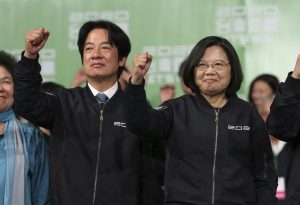Taiwan’s incumbent President Tsai Ing-wen won a landslide victory in Saturday’s election. Tsai of the Democratic Progressive Party (DPP) routed challenger Han Kuo-yu of the Nationalist Party (KMT), winning with 57.13 percent of votes to Han’s 38.61 percent. A third party candidate, James Soong, notched 4.26 percent.
Tsai’s margin of victory was even greater than her initial election victory in 2016, when she handily dispatched the KMT’s Eric Chu 56.1 percent to 31 percent. The absolute number of votes Tsai received was also far greater – in 2016 she won with 6.89 million votes, whereas on Saturday she garnered 8.17 million. According to Taiwan’s state-run Central News Agency, “Tsai’s vote total was the highest ever recorded for any candidate in a presidential election in Taiwan.”
The election was marked by high turnout at 74.9 percent. As of this writing no demographic data on polling was available, but Tsai’s margin of victory suggests that young people, who are more likely to support her, turned out to cast their votes.
In an interesting twist, however, Tsai’s DPP did not win the legislative polls quite as convincingly. Although the DPP will maintain its majority in the 113-seat Legislative Yuan, it dropped from 68 seats to 61. The KMT, meanwhile, picked up three seats and will have 38 members in the new Legislative Yuan. And both parties were neck-and-neck in the party voting, with each winning 13 seats. (Taiwan’s Legislative Yuan has 73 members elected from geographical constituencies, 34 selected according to proportional representation in a national party vote, and six from aboriginal constituencies.)
The new Taiwan People’s Party, founded in August 2019 by Taipei’s Mayor Ko Wen-je, made the biggest impression of the other parties, notching five seats in the party list vote. Speculation is already rising that Ko will throw his hat in the ring for the next presidential election, after declining to do so in 2020. The New Power Party (three seats) and Taiwan Statebuilding Party (one seat) also won legislative seats, along with five independents.
The KMT will be disappointed with the result – while Han had trailed Tsai by double-digits for months in the polls, the Legislative Yuan was seen as winnable for the opposition party. Instead, Tsai returns to office with not only a renewed mandate, but a friendly legislature to help move forward her agenda. KMT chairman Wu Den-yih announced that he and the other members of the party leadership will resign next week after the resounding loss.
Han, despite running a divisive campaign, stressed unity in his concession speech, declaring “When we wake up tomorrow, we still want to see a united Taiwan.” When supporters attempted to boo Tsai, he quieted them.
“Taiwan’s democracy, freedom and rule of law are the most valuable treasures we have,” he said. “Since the people of the Republic of China have made their decision, as candidates, we will definitely obey the results of the election.”
Tsai struck a similar note of unity in her victory speech, thanking “everyone who voted today. Regardless of how you voted, by taking part in this election you have put democratic values into practice.
“With each presidential election, Taiwan is showing the world how much we cherish our free, democratic way of life, and how much we cherish our nation: the Republic of China (Taiwan).”
That sentiment was evident halfway around the world as well. At an election watch event in Washington, D.C., Ambassador Stanley Kao, Taiwan’s top representative in the United States, declared that the election was a victory for all Taiwanese because it showcased the country’s robust democracy. The same message was repeated by other speakers, from Deputy Assistant Secretary of State for East Asian & Pacific Affairs Jonathan Fritz to Randall Schriver, who until December was the assistant secretary of defense for Asian and Pacific security affairs and currently serves as the chairman of the Project 2049 Institute. According to Fritz, Taiwan’s robust democracy serves as an example for the entire Indo-Pacific region and indeed the world.
Another point the speakers agreed upon was that the election was a message to China. In the lead-up to the polls, there were numerous reports of election interference from Beijing, including rampant disinformation campaigns. The Chinese government favors the KMT, which originated on the mainland and has a stronger stake in the “one China” narrative; Beijing views Taiwan’s homegrown DPP, and Tsai herself, as pro-independence, despite Tsai’s repeated declarations that she seeks to maintain the cross-strait status quo. Given China’s clear preference and attempts to sway Taiwan’s electorate, the election results were seen as a setback for Beijing.
As Tsai herself put it, “The results of this election carry an added significance, because they have shown that when our sovereignty and democracy are threatened, the Taiwanese people will shout our determination even more loudly back.”
She emphasized her “commitment to peaceful, stable cross-strait relations” and urged China to work alongside her to that end. “I also hope that the Beijing authorities understand that democratic Taiwan, and our democratically-elected government, will not concede to threats and intimidation… The results of this election have made that answer crystal clear,” Tsai continued.
Beijing cut off all official cross-strait interactions with Taiwan’s government the day Tsai initially assumed office. It has refused to deal with her unless Tsai explicitly embraces the “1992 consensus,” which holds that both sides of the strait belong to one China – without specifying which is the rightful government.
A statement from the mainland’s Taiwan Affairs Office on the elections gave no indication that had changed. “We are willing to promote the peaceful development of cross-strait relations with our Taiwan compatriots on the basis of persevering with the ‘1992 Consensus’ and opposing ‘Taiwan independence,’” a TAO spokesperson said.
































